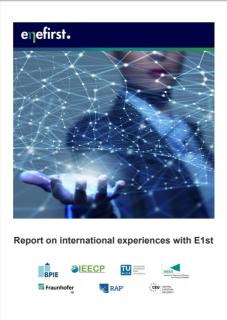
ENEFIRST is a three-year project funded under the Horizon2020 programme, which aims to make the “Efficiency First” (E1st) principle more concrete and operational, to improve the understanding of its relevance for decision processes related to energy demand and supply and its broader impacts across sectors and markets, focusing on the building sector and related energy systems in EU Member States. E1st gives priority to demand-side resources whenever they are more cost-effective from a societal perspective than investments in energy infrastructure for meeting policy objectives. It is a decision principle that is applied systematically at any level to energy-related investment planning and is enabled by an “equal opportunity” policy design.
This report reviews 16 examples from Europe and the United States that have implemented the E1st principle in practice. The objective of this report is to analyse why and how E1st has been implemented and what lessons can be learned from these experiences. These examples also show policymakers, regulators, and energy policy actors that the concept of E1st can be implemented and can provide various benefits to the energy.
The examples of the report include:
- Using time-of-use tariffs to engage customers and benefit the power system
- Social Constraint Management Zones to harvest demand flexibility
- Demand flexibility in District Heating networks
- Participation of Demand Response in French wholesale electricity market
- Replacing a polluting power plant with behind-the-meter resources
- Updating distribution system planning rules in Colorado and Nevada
- Assessing the value of demand-side resources
- Water heaters as multiple grid resources
- Building Logbook–Woningpas: Exploiting efficiency potentials in buildings through a digital building file
- Optimising building energy demand by passive-level building code
- Deferring transmission and distribution infrastructure investments through local end-use efficiency measures
- Building energy performance requirements of the Irish Heat Pump System grant
- Fabric First approach under the Better Energy Communities grant scheme in Ireland
- Linking renewable support to building energy performance
